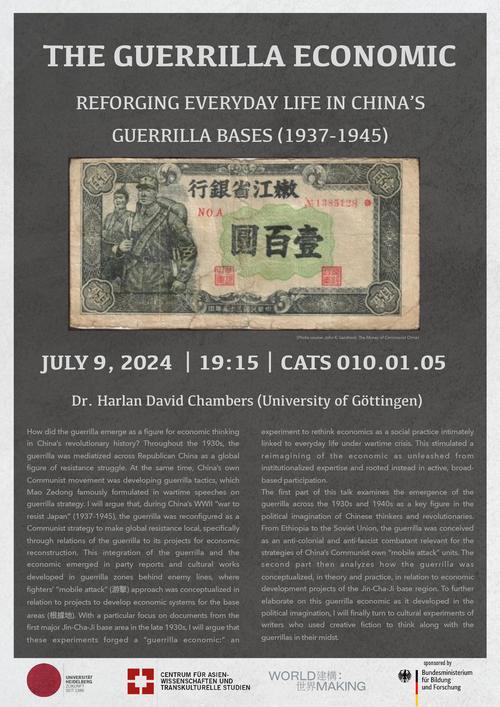The Guerrilla Economic: Reforging Everyday Life in China’s Guerrilla Bases (1937-1945)
Speaker: Dr. Harlan David Chambers (University of Göttingen)
How did the guerrilla emerge as a figure for economic thinking in China’s revolutionary history? Throughout the 1930s, the guerrilla was mediatized across Republican China as a global figure of resistance struggle. At the same time, China’s own Communist movement was developing guerrilla tactics, which Mao Zedong famously formulated in wartime speeches on guerrilla strategy. I will argue that, during China’s WWII “war to resist Japan” (1937-1945), the guerrilla was reconfigured as a Communist strategy to make global resistance local, specifically through relations of the guerrilla to its projects for economic reconstruction. This integration of the guerrilla and the economic emerged in party reports and cultural works developed in guerrilla zones behind enemy lines, where fighters’ “mobile attack” (游擊) approach was conceptualized in relation to projects to develop economic systems for the base areas (根據地). With a particular focus on documents from the first major Jin-Cha-Ji base area in the late 1930s, I will argue that these experiments forged a “guerrilla economic:” an experiment to rethink economics as a social practice intimately linked to everyday life under wartime crisis. This stimulated a reimagining of the economic as unleashed from institutionalized expertise and rooted instead in active, broad-based participation.
The first part of this talk examines the emergence of the guerrilla across the 1930s and 1940s as a key figure in the political imagination of Chinese thinkers and revolutionaries. From Ethiopia to the Soviet Union, the guerrilla was conceived as an anti-colonial and anti-fascist combatant relevant for the strategies of China’s Communist own “mobile attack” units. The second part then analyzes how the guerrilla was conceptualized, in theory and practice, in relation to economic development projects of the Jin-Cha-Ji base region. To further elaborate on this guerrilla economic as it developed in the political imagination, I will finally turn to cultural experiments of writers who used creative fiction to think along with the guerrillas in their midst.
Zeit & Ort
09.07.2024 | 19:15
CATS R. 010.01.05

